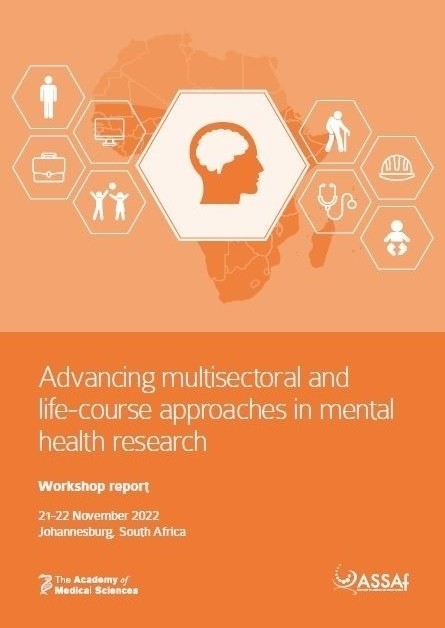On 21-22 November 2022, the UK Academy of Medical Sciences and the Academy of Sciences of South Africa jointly organised a workshop to explore ways to advance multisectoral and life-course approaches in mental health research in Africa. It was followed by a researcher capacity building workshop.
Status: In progress- You are here:
- Mental Health Workshop: South Africa
Mental Health Workshop: South Africa
In November 2022, the UK Academy of Medical Sciences and the Academy of Sciences of South Africa jointly organised a workshop to explore ways to advance multisectoral and life-course approaches in mental health research in Africa. The mental health meeting was followed by a researcher capacity building meeting.
This meeting was intended to build upon two previous Academy meetings on mental health: In 2019, the UK Academy of Medical Sciences and the Academy of Science of South Africa (ASSAf) held a joint meeting in London, UK, on social determinants of mental health and development of a strategic research agenda for sub-Saharan Africa. In November 2022, a follow-up meeting was held in Johannesburg, South Africa, to take stock of developments since 2019 and to discuss how best to take forward mental health research in the region.
Note: To narrow the broad scope of the workshop, the workshop predominately focused on and provided a platform for perspectives from East, Central, West and South Africa.
Mental and behavioural problems account for 6.6% of the global burden of disease (including substance use conditions) and are the leading contributor to the economic cost of non-communicable diseases. Some estimates have placed the figure of the global burden of disease to be even higher at 13%, when including the premature mortality associated with having a mental health condition. In Lower and Middle-Income Countries, the cost of mental illness in 2010 was estimated at $870 billion and it is projected to at least double by 2030. However, the WHO’s most recent Mental Health Atlas showed that in 2020, governments worldwide spent on average just 2% of their health budgets on mental health.
Despite a growing global recognition of the importance of mental health, as reflected in its inclusion as a health priority in the United Nation’s Sustainable Development Goals (SDGs), fewer than one in four people with a mental health disorder receive treatment. Within low-resource settings, access to treatment is even more limited, with many low-income countries reporting having fewer than 1 mental health worker per 100 000 people. In 2018, the Academy of Medical Sciences produced a report exploring the barriers and challenges to strengthening mental health services in LMICs. A key overarching issue highlighted in the report was the need to expand coverage to treatments. Since the report, there has been ongoing work in this space, this includes the WHO’s special initiative for Mental Health (2019-2023) to ensure universal health coverage for mental health in 12 priority countries to 100 million more people; UNICEF’s comprehensive report, The State of the World’s Children 2021, examining child, adolescent and caregiver mental health; and the Lancet Commission’s on mental health and sustainable development and one on stigma and discrimination in mental health. In addition, there is limited engagement across sectors to advance and scale up mental health promotion and prevention activities, in spite of robust evidence demonstrating effectiveness.
The WHO released its World Mental Health Report: transforming mental health for all, highlighting why and where change is most needed and how it can be best be achieved, including around mental health research. For example, the report highlighted how less than 5% of mental health research funding goes to LMICS and most research is basic rather than clinical or applied. The Africa Center for Disease Control and Prevention (Africa CDC) also launched, the Africa CDC Non-Communicable diseases and injuries prevention and control and mental health promotion strategy (2022-26), which also included reference to research. For example, the need to enhance continental capacity to produce and apply contextually relevant research for Africa-led mental health priorities.
[Note on terminology: To narrow the broad scope of the workshop, the workshop predominately focused on and provided a platform for perspectives from East, Central, West and South Africa. To denote this geographical focus, we are using the term ‘sub-Saharan’ Africa]
The main objectives of the workshop were as follows:
- Comprehensively review the evidence on multisectoral and life-course approaches for mental health in sub-Saharan Africa and understand the gaps.
- Identify research innovations and interventions, from both outside and within health systems, that could provide solutions to strengthen socialnd health systems for mental health; and
- Bring together stakeholders, including researchers, community engagement specialists, representatives from key organisations such as the WHO and Africa CDC to outline priority research areas and opportunities for collaboration, which stakeholders can take forwards within their own settings.
To achieve the above, the workshop intended to:
- Learn from the existing evidence from sub-Saharan African countries and the UK on multisectoral and life-course approaches on mental health, including lived experience and community perspectives.
- Share examples of positive innovations focused on multisectoral and life-course approaches.
- Consider how health and social care systems should respond to mental health needs, including those exacerbated by COVID-19, by discussing key challenges in the provision of effective programmes.
- On the basis of the evidence, identify gaps in our knowledge and the associated research priorities.
- Consider lessons and interventions that can be learned from one setting and applied more widely.
- Identify areas where research can create an enabling environment for evidence-based policy interventions.
A report from the workshop is currently being developed and will be available to read here on the webpage shortly.
